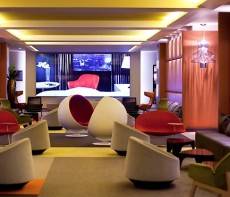June 2, 2015
The bonds that link work with place are loosening day by day
 Over the decades designing productive spaces for work has focused on redefining the corporate office and its surroundings. While there are examples of quality design in buildings around the world, there is a growing movement that challenges the presumption that work should always be done “at work”. If we aim to allow people to be at their best, develop and nurture creativity and maximise quality output then we must ensure the place where the work is done is outstanding. Sarah Kathleen Peck of ‘It starts with’ summed it up when she wrote “There are people, places and things that make me feel like I’m building my energy stores, that rejuvenate me, and help me to do my best work. Likewise, there are also people and places that zap my energy; that leave me exhausted; that make me feel as though I’ve waste my time and my energy – and my day – without getting anything useful done.”
Over the decades designing productive spaces for work has focused on redefining the corporate office and its surroundings. While there are examples of quality design in buildings around the world, there is a growing movement that challenges the presumption that work should always be done “at work”. If we aim to allow people to be at their best, develop and nurture creativity and maximise quality output then we must ensure the place where the work is done is outstanding. Sarah Kathleen Peck of ‘It starts with’ summed it up when she wrote “There are people, places and things that make me feel like I’m building my energy stores, that rejuvenate me, and help me to do my best work. Likewise, there are also people and places that zap my energy; that leave me exhausted; that make me feel as though I’ve waste my time and my energy – and my day – without getting anything useful done.”











 Just a few days ago,
Just a few days ago,  The recent Cabinet reshuffle in the UK Government won’t alter one fact; politicians simply don’t get it when it comes to technology, the workplace, the way people work and the needs of small businesses. Once you dismiss the paranoid idea that they DO get it but don’t care because they’re too busy looking out for The Man, you have to conclude that one of the big problems they have (this won’t go where you think) is that they don’t understand anything about technology and work, especially when it comes to emerging technology, the working lives of individuals, the needs and functions of small businesses and the fact the self-employed exist at all. These things exist outside the bubble. This is obviously a problem because they are implementing policies and making big, uninformed and anachronistic decisions about the things that shape every aspect of our lives, help to define us as people and determine how companies and individuals function. Here are just three examples.
The recent Cabinet reshuffle in the UK Government won’t alter one fact; politicians simply don’t get it when it comes to technology, the workplace, the way people work and the needs of small businesses. Once you dismiss the paranoid idea that they DO get it but don’t care because they’re too busy looking out for The Man, you have to conclude that one of the big problems they have (this won’t go where you think) is that they don’t understand anything about technology and work, especially when it comes to emerging technology, the working lives of individuals, the needs and functions of small businesses and the fact the self-employed exist at all. These things exist outside the bubble. This is obviously a problem because they are implementing policies and making big, uninformed and anachronistic decisions about the things that shape every aspect of our lives, help to define us as people and determine how companies and individuals function. Here are just three examples.









July 9, 2015
London transport shuts down ….. agile workers unaffected …..
by Paul Carder • Cities, Comment, Flexible working, Wellbeing
(more…)